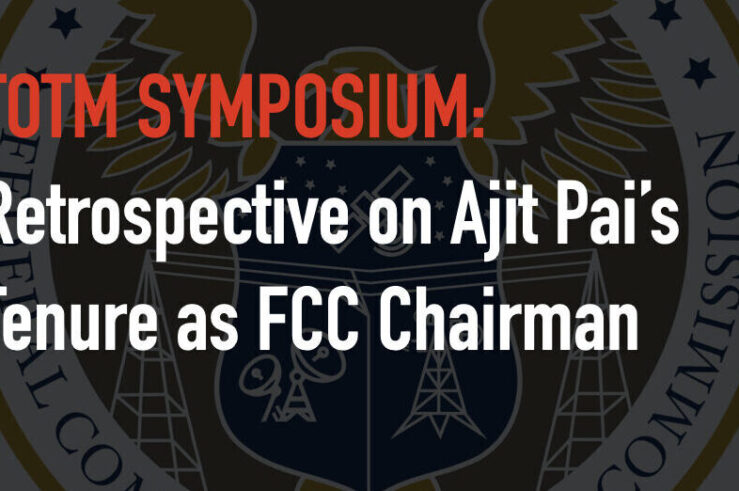Showing results for: “Google shopping manne”
Using the Hypothetical Monopolist Test to Define the Relevant Market for Ad Tech
Policymakers’ recent focus on how Big Tech should be treated under antitrust law has been accompanied by claims that companies like Facebook and Google hold dominant positions in various “markets.” Notwithstanding the tendency to conflate whether a firm is large with whether it hold a dominant position, we must first answer the question most of ... Using the Hypothetical Monopolist Test to Define the Relevant Market for Ad Tech
Online Display Advertising: What’s the relevant market?
Digital advertising is the economic backbone of the Internet. It allows websites and apps to monetize their userbase without having to charge them fees, while the emergence of targeted ads allows this to be accomplished affordably and with less wasted time wasted. This advertising is facilitated by intermediaries using the “adtech stack,” through which advertisers ... Online Display Advertising: What’s the relevant market?
How Changing Section 230 Could Disrupt Insurance Markets
In recent years, a diverse cross-section of advocates and politicians have leveled criticisms at Section 230 of the Communications Decency Act and its grant of legal immunity to interactive computer services. Proposed legislative changes to the law have been put forward by both Republicans and Democrats. It remains unclear whether Congress (or the courts) will ... How Changing Section 230 Could Disrupt Insurance Markets
Antitrust Statutorification
A lot of water has gone under the bridge since my book was published last year. To close this symposium, I thought I would discuss the new phase of antirust statutorification taking place before our eyes. In the United States, Congress is working on five antitrust bills that propose to subject platforms to stringent obligations, ... Antitrust Statutorification
Breaking Down House Democrats’ Forthcoming Competition Bills
Democratic leadership of the House Judiciary Committee have leaked the approach they plan to take to revise U.S. antitrust law and enforcement, with a particular focus on digital platforms. Broadly speaking, the bills would: raise fees for larger mergers and increase appropriations to the FTC and DOJ; require data portability and interoperability; declare that large ... Breaking Down House Democrats’ Forthcoming Competition Bills
European Commission Objection to App Store Rules Lack Empirical Support
The European Commission recently issued a formal Statement of Objections (SO) in which it charges Apple with antitrust breach. In a nutshell, the commission argues that Apple prevents app developers—in this case, Spotify—from using alternative in-app purchase systems (IAPs) other than Apple’s own, or steering them towards other, cheaper payment methods on another site. This, ... European Commission Objection to App Store Rules Lack Empirical Support
The FTC Did Not ‘Fumble the Future’ in Its Google Search Investigation
Politico has released a cache of confidential Federal Trade Commission (FTC) documents in connection with a series of articles on the commission’s antitrust probe into Google Search a decade ago. The headline of the first piece in the series argues the FTC “fumbled the future” by failing to follow through on staff recommendations to pursue ... The FTC Did Not ‘Fumble the Future’ in Its Google Search Investigation
Congress Should Not Legalize a News Media Cartel
Amazingly enough, at a time when legislative proposals for new antitrust restrictions are rapidly multiplying—see the Competition and Antitrust Law Enforcement Reform Act (CALERA), for example—Congress simultaneously is seriously considering granting antitrust immunity to a price-fixing cartel among members of the newsmedia. This would thereby authorize what the late Justice Antonin Scalia termed “the supreme ... Congress Should Not Legalize a News Media Cartel
Platform Self-Preferencing Can Be Good for Consumers and Even Competitors
Critics of big tech companies like Google and Amazon are increasingly focused on the supposed evils of “self-preferencing.” This refers to when digital platforms like Amazon Marketplace or Google Search, which connect competing services with potential customers or users, also offer (and sometimes prioritize) their own in-house products and services. The objection, raised by several ... Platform Self-Preferencing Can Be Good for Consumers and Even Competitors
Ajit Pai Brought the FCC’s Media Ownership Rules into the Modern Age
I’m delighted to add my comments to the chorus of voices honoring Ajit Pai’s remarkable tenure at the Federal Communications Commission. I’ve known Ajit longer than most. We were classmates in law school … let’s just say “many” years ago. Among the other symposium contributors I know of only one—fellow classmate, Tom Nachbar—who can make ... Ajit Pai Brought the FCC’s Media Ownership Rules into the Modern Age
The DOJ’s Antitrust Case Against Google: A Tough Slog, but Maybe an Intriguing Possibility?
The U.S. Department of Justice’s (DOJ) antitrust case against Google, which was filed in October 2020, will be a tough slog.[1] It is an alleged monopolization (Sherman Act, Sec. 2) case; and monopolization cases are always a tough slog. In this brief essay I will lay out some of the issues in the case and raise ... The DOJ’s Antitrust Case Against Google: A Tough Slog, but Maybe an Intriguing Possibility?
Why the Federal Government’s Antitrust Case Against Google Should—and Likely Will—Fail
On October 20, 2020, the U.S. Department of Justice (DOJ) and eleven states with Republican attorneys general sued Google for monopolizing and attempting to monopolize the markets for general internet search services, search advertising, and “general search text” advertising (i.e., ads that resemble search results). Last week, California joined the lawsuit, making it a bipartisan ... Why the Federal Government’s Antitrust Case Against Google Should—and Likely Will—Fail













